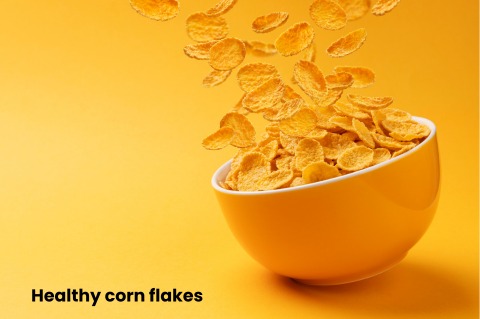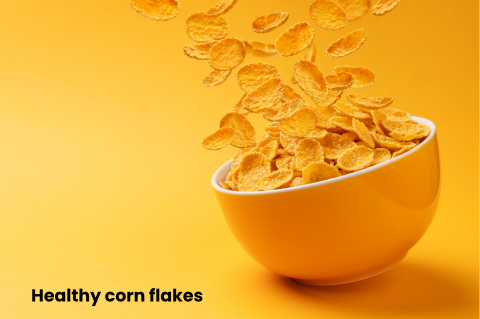Categories
Contact info
-
Our office
A-1, Envanto Headquarters,
Melbourne, Australia. -
Phone
+(00)-999-999-9999
000-000-0000 - Email info@example.com

Top 5 Benefits of Corn Flakes, Nutrition, Types of Corn Flakes, Draw Backs
“Today’s breakfast cereal is cornflakes!” Corn flakes are a type of breakfast cereal made from toasted flakes of corn. They are typically eaten with milk and often topped with fruits, nuts, or sweeteners like sugar or honey.
For many years, cornflakes have been a favourite breakfast cereal. It tastes great served hot or cold with a bowl of milk. This is a quick and simple meal to prepare. This breakfast cereal, whole of taste and nutrients, is a favourite for children and even older people. Please continue reading to learn more about cornflakes, their advantages, and the healthiest ones.
Many individuals choose cornflakes for breakfast because of their simplicity of use, mild flavour, and crispiness. They are a source of essential nutrients, including iron, folic acid, and various B vitamins, because they are often enriched with vitamins and minerals.
Benefits of Corn Flakes: Nutritional Value
The nutritional value of cornflakes can vary depending on the brand and any additional fortification or ingredients. However, here is a general overview of the typical dietary profile of cornflakes per serving (around 1 cup or 28 grams):
Calories: Approximately 100-130 calories
Carbohydrates: Around 24-30 grams
Protein: Approximately 1-3 grams
Fat: Usually minimal, less than 1 gram
Fiber: Around 1-3 grams
Sugar: Varies but often contains added sugars, ranging from 1-6 grams per serving
Sodium: Typically low, around 100-200 milligrams
Some V-pure cornflakes online may also be enriched with extra vitamins and minerals like zinc, calcium, and vitamin D to improve their nutritional value.
It’s important to remember that cornflakes can be a quick and easy breakfast choice, but they might also have lower fibre and added sugars than other whole-grain cereals. As a result, eating fresh fruit for extra nutrients and fibre and protein-rich meals like yoghurt or eggs with cornflakes is a good idea as part of a balanced breakfast.
Benefits of Corn Flakes:
While cornflakes can be included in a healthy breakfast, it’s essential to consider both the positive and negative aspects of each item when assessing cornflakes as a whole. Here is a brief explanation:
Potential benefits:
1. Fiber source (Benefits of corn flakes)
Corn flakes contain some fibre, which is important for digestion, gut health and Benefits of corn flakes for weight loss.
2. Enriched nutrients (Benefits of corn flakes)
Many brands fortify their cornflakes with vitamins and minerals like iron, thiamine (vitamin B1), and niacin (vitamin B3), which can contribute to daily needs.
3. Low in fat and cholesterol (Benefits of corn flakes)
Corn flakes are naturally low in both, making them a potentially suitable choice for individuals on specific diets.
4. Convenience (Benefits of corn flakes)
They’re easy to prepare and require no cooking, making them a quick breakfast option.
5. Versatility (Benefits of corn flakes)
You can customize cornflakes with various toppings like fruits, nuts, seeds, or milk alternatives to enhance their nutritional profile and flavour. V-pure try tasty breakfast items online with essential nutrients.
Important considerations of Benefits of corn flakes
Limited nutritional content: While being fortified, protein, vitamins A and C, and vital minerals like calcium and potassium are typically absent from cornflakes. Combining them with nutritious foods like milk, fruits, or nuts is essential.
High sugar content: Many brands include added sugars, which raises the amount of sugar you consume each day. Choose reduced-sugar varieties or add natural sweeteners such as fruits.
Refined grains: Compared to whole-grain choices, cornflakes with a higher fibre content and potential benefits of corn flakes usually come from refined grains.
Sodium content: Be careful of sodium content, mainly if you follow a strict diet.
Overall:
Cornflakes can be a convenient breakfast option, but the benefits of cornflakes depend on how you consume them. Consider:
1. Choosing brands with minimal added sugars and higher fibre content.
2. Pairing them with nutrient-rich additions like milk, fruits, nuts, or seeds.
3. Including them as part of a balanced breakfast that incorporates other whole foods.
Remember that variety is essential to a balanced diet. For a more varied and nourishing morning routine, consider switching up your protein-, vitamin-, and mineral-rich breakfast selections from cornflakes.
Benefits of Corn Flakes: Most Common Types of Flaked Cereals
Several types of flaked cereals are available, each made from different grains or combinations of grains. Here are some common types of flaked cereals:
1. Corn Flakes: One of the most popular varieties of flaked cereals is made from maize. Usually toasted and little sweetened, they have a mild flavour and crisp texture.
2. Wheat Flakes: To make wheat flakes, all the kernels are toasted and crushed. They are typically used as a base for cereal or eaten with milk and fruits because of their robust texture and nutty flavour.
3. Rice Flakes: Boiled rice grains are squashed into thin flakes to create rice flakes, sometimes called poha or flattened rice. They are frequently used as a wheat-free substitute for other flaked grains, such as poha, in Indian cooking.
4. Oat Flakes: Rolled oats are crushed with rollers to make oat flakes. They are frequently used to bake items for texture and nutrition or to produce muesli.
5. Barley Flakes: Steamed, rolled, and crushed barley grains make barley flakes. Like rolled oats, they have a chewy texture and nutty flavour.
6. Spelt Flakes: Spelt grains, an ancient wheat variety, are used to make spelt flakes. They taste a little sweeter than rolled oats but look and feel the same.
7. Multigrain Flakes: Various grains, including wheat, corn, oats and barley, are combined to make multigrain flakes. They provide a wide range of nutrients from the various grains, tastes, and textures.
These are just a few examples of flaked cereals available on the market. Each type of flaked cereal offers its unique flavour, texture, and nutritional profile, providing consumers with plenty of options based on their preferences and dietary needs.
Benefits of corn flakes V/S Drawbacks of Corn Flakes
1. Limited Nutrients: Protein, vitamins (particularly A and C), and essential minerals like calcium and potassium are often lacking in cornflakes. Some nutrients require enrichment and additional ingredients.
2. High Sugar Content: Many brands contain added sugars, contributing to your daily sugar intake, especially for children.
3. Sodium: Watch out for sodium levels, especially if you have dietary restrictions.
4. Refined Grains: Compared to whole-grain options, cornflakes contain less fibre and may offer fewer health advantages because the majority of them are made from refined grains.
There is no doubt that it is an excellent choice for a ready-to-eat breakfast. V-pure provides healthy and enriched nutrient cornflakes that are all made of healthy ingredients. But it’s also important to consider how cornflakes compare in terms of benefits and drawbacks. When consuming mindful food in small amounts, you may reduce unwanted effects yet continue enjoying the benefits of cornflakes for women. Another option is to search for healthier ways to top your bowl of cornflakes.




Leave A Comment